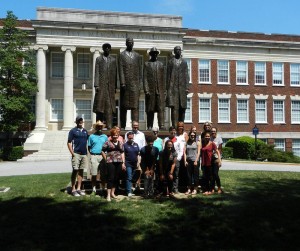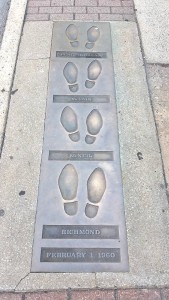Day 2: Atlanta, GA (Jake Edmunds)
I’m looking now at a bronze sculpture (in the Martin Luther King, Jr. National Historic Site) of a man in a loincloth lifting an infant, Simba-style, to the heavens. Titled “Behold,” the statue honors the tradition of some African peoples of taking a newborn child to a clearing, lifting him or her to the sky and declaring: “behold, the only thing greater than you.”
In this Herculean statue I can see a double-symbolism, a message that extends to visitors to the park as both individuals and as a community. The bronze man seems to simultaneously herald in the days in which no man is seen as superior to any other, and to beckon visitors to embody Dr. King’s greatness and selflessness themselves. He addresses, then, the world at large by reminding us that the child in his arms is to be respected as a fellow human being, and addresses the child himself by reminding him that he ought to live his life as though he has no limits. The MLK Jr. NHS holds more museums and historic sites than can possibly be explored in the depth that they deserve in one day, but for the moment I am content to simply smell the aura of this place. So I sit and contemplate the challenge set forth by the bronze father: the challenge both for his son and for the world around him. The message is personal, and I can feel it pressing me from both sides. How can I strive to live up to the examples set by men such as Dr. King? How must I act if I am to recognize the humanity, the image of God, in all men and women?
This sculpture is nestled between the historic and new Ebeneezer Churches. I wonder what it would be like to worship the Lord in the presence of sisters and brothers in Christ each Sunday and be greeted upon leaving or entering the church by this bold image?
“If you begin something, and you don’t remember where you came from, you’ll eventually find yourself right back where you started.” -Mrs. Juanita Abernathy
Filed under Uncategorized | Comment (0)Day 2 Atlanta, Georgia (Madi Keaton)
Today, we travelled to Atlanta, Georgia and visited the MLK Center as well as Georgia State University to hear Dr. Glenn Eskew and Mrs. Juanita Abernathy speak. While these experiences were inspiring and will forever hold special places in my memory, it was an event that was not on the itinerary that made the biggest impact on me today.
While I was leaving the MLK Center to get back onto the bus, I met a homeless man named Leonard. As I talked to him, I learned that he was having health issues and was doing odd jobs to get by. I had never had a homeless man approach me before, let alone hold a conversation with me.
Driving through the outskirts of Atlanta, it seemed as though every patch of grass held a homeless person’s belongings. I noticed that, overwhelmingly, these people were black.
Dr. Martin Luther King Jr. once said,
New laws are not enough. The emergency we now face is economic, and it is a desperate and worsening situation. For the 35 million poor people in America…there is a kind of strangulation in the air. In our society it is a murder, psychologically, to deprive a man of a job or an income. You are in substance saying to that man that he has no right to exist.
Dr. King’s goals of desegregation and equal treatment have only been partially realized. While black and white people can eat in the same restaurants and drink from the same water fountains, blacks have been forced into a spiraling cycle of inequality and poverty that has not been fixed. How could America, one of the most advanced nations on earth, hold so many people without a house, job, or healthcare? And, if black people make up the majority of our homeless population, as well as our prison population, have we truly broken through racial barriers and into a period of equality?
I don’t think so.
The very thought of this has been on my mind all day. I had just finished walking through a museum heralding Dr. King as a heroic leader and listing his impressive achievements. And yet, it seemed as though enough had not been changed. I tried desperately to think of what I could do to help this issue, but thought of no grand ideas. I was no Dr. King.
But then I remembered something.
Towards the end of our conversation, I told Leonard that I was heading to Georgia State University next. He told me that the students there were always so kind to the homeless and that he was thankful to the college for educating such caring people.
Maybe I can’t find jobs and medical care and food for all of Atlanta’s homeless, but I certainly could show them the love of Christ. Maybe I couldn’t change the racial prejudices in people’s hearts, but I could examine and work on the prejudices in my own.
Everyone, even the great Dr. King, must start with these steps. And maybe, with concentrated effort and communication with other reconcilers, together we can finish the job that Dr. King started and build America into a better society with equal treatment and a bed for every man and woman.
Filed under Uncategorized | Comment (0)
Day 2 Atlanta, GA ( Jocelyn Chavous)
Reflecting on all that I’ve seen and heard today, from the MLK Center to hearing Juanita Abernathy speak, one question continues to surface to the forefront of my mind.
“Where is our Martin Luther King Jr. today?”
Dr. King was truly an extraordinary orator, pastor and leader. I have never seen or heard anyone so charismatic and passionate as that man. Without a doubt in my mind, he is unparalleled. So thinking about it now, my initial question seems irrelevant since I believe there can never be anyone like Dr. King.
But, why do I still hope for a man to rise up and instill the same teachings of peace, love and justice to this world today? Why do I need some sort of prophet to follow?
Dr. King was a man who won the hearts and trust of many. He was unwavering in his pursuit of freedom and happiness and stared at the harsh realities of this world and the possibility of death everyday as he worked in the Civil Rights Movement.
Despite his ability to reach thousands and travel to a higher place of understanding, wisdom, and peace he was still human.
And realizing his humanity, he could stand in front of his followers and acknowledge his own mortality while resting in God’s immortality.
Dr. King understood that leaders fall. Man will inevitably perish, but the everlasting Father in Heaven will forever remain.
I believe that we do not have to go seeking a new prophet. Man will fail. Yet, the greatest prophet of them all already came and died for our sins. Jesus was the only perfect prophet and Son of God who completed the work that needed to be done through his death.
That being said, as his followers we are given a charge to continue a work that was started and completed on the cross. We do not need to be told what we should do. We already know what to do because of the instructions in the Bible, Christ’s teachings and through the Holy Spirit that resides in us.
As followers of Christ, I don’t think we need to wait on someone to try and inspire us to make a change. Of course we need strong Christian leaders in this world, but at the same time, being a Christian alone should individually inspire us to make a change in whatever way we can in the places we are currently at.
We have to be leaders for Christ. That is what Dr. King was. With his faith and Christianity as his backbone, he took every blow, every obstacle, every threat and could not be brought to his knees unless it was for prayer. His faith in God’s character and love for his children is what motivated him to do all the things he did.
That’s why it is encouraging to know that the same God that inspired Dr. King should be the same God who inspires us to make a difference.
Filed under Uncategorized | Comment (0)
Day 1 Greensboro, NC (Joanna Hadley-Evans)
End of Day One and we’re a little fatigued after our early departure this morning. Our group is getting to know one another and share experiences as we begin to retrace the footsteps of civil rights legends.
Today we visited the campus of North Carolina A & T to see a monument dedicated to Joseph McNeil, Franklin McCain, David Richmond, and Ezell Blair, Jr. These four black men were freshmen in college when their peaceful sit-in at the local Woolworth lunch counter prompted others to the same non-violent direct call to action.
My thoughts were drawn to my own high school years today. I participated in my school’s Multicultural Awareness Club in which I was one of three whites among several dozen black classmates. It was the first time in my life to experience feeling like I was in the minority. The first occurrence of my white privilege slapping me in the face, though at the time, I would have been unable to articulate its impact.
Our club traveled south one year, touring several black colleges, including A & T. Regretfully, I do not recall learning of these four civil rights legends during that visit, although I’m sure we were told.
I am grateful for this opportunity to retrace my, and more importantly, their steps.
Filed under Uncategorized | Comment (0)2016 Tour Participants
This year, Messiah College is sending 11 employees and five students to participate in the “Returning to the Roots of the Civil Rights Bus Tour.” They are Tiffany Burrows, Joanna Hadley-Evans, Kris Hansen-Kieffer, Robin Lauermann, Caroline Maurer, Paula Maynard, Randy Ness, Don Opitz, Rachel Shenk, Sarah Wade, Scott Zeigler, Jocelyn Chavous, Abbey Combs, Jacob Edmunds, Madilyn Keaton and Kenedy Kieffer .
The trip runs from June 11–19, 2016, and will visit several historic sites of the civil rights movement in North Carolina, Georgia, Alabama, Mississippi, and Tennessee. Part of their time will also be spent meeting with and hearing from various leaders and scholars of the civil rights movement. The participants will post to this blog during their trip, offering insight and reflection on their experience.
Filed under Uncategorized | Comment (1)
